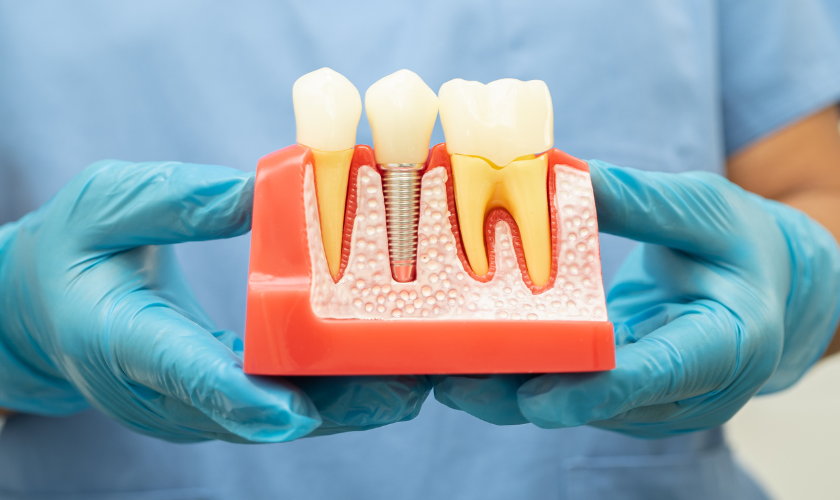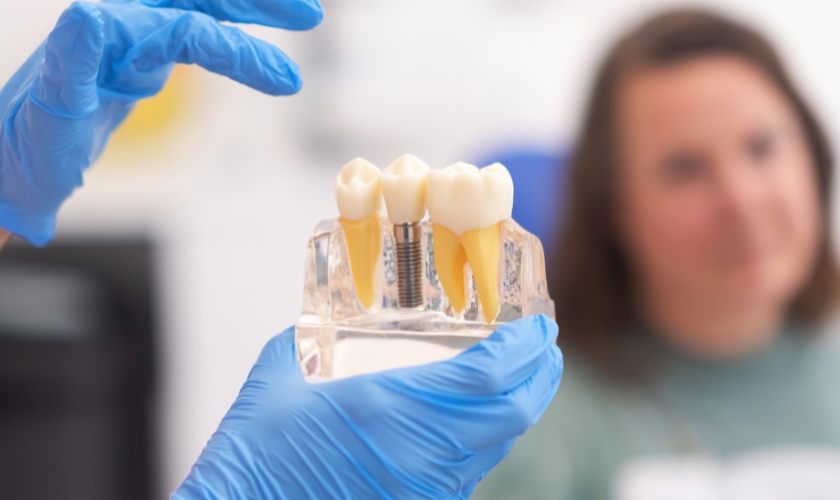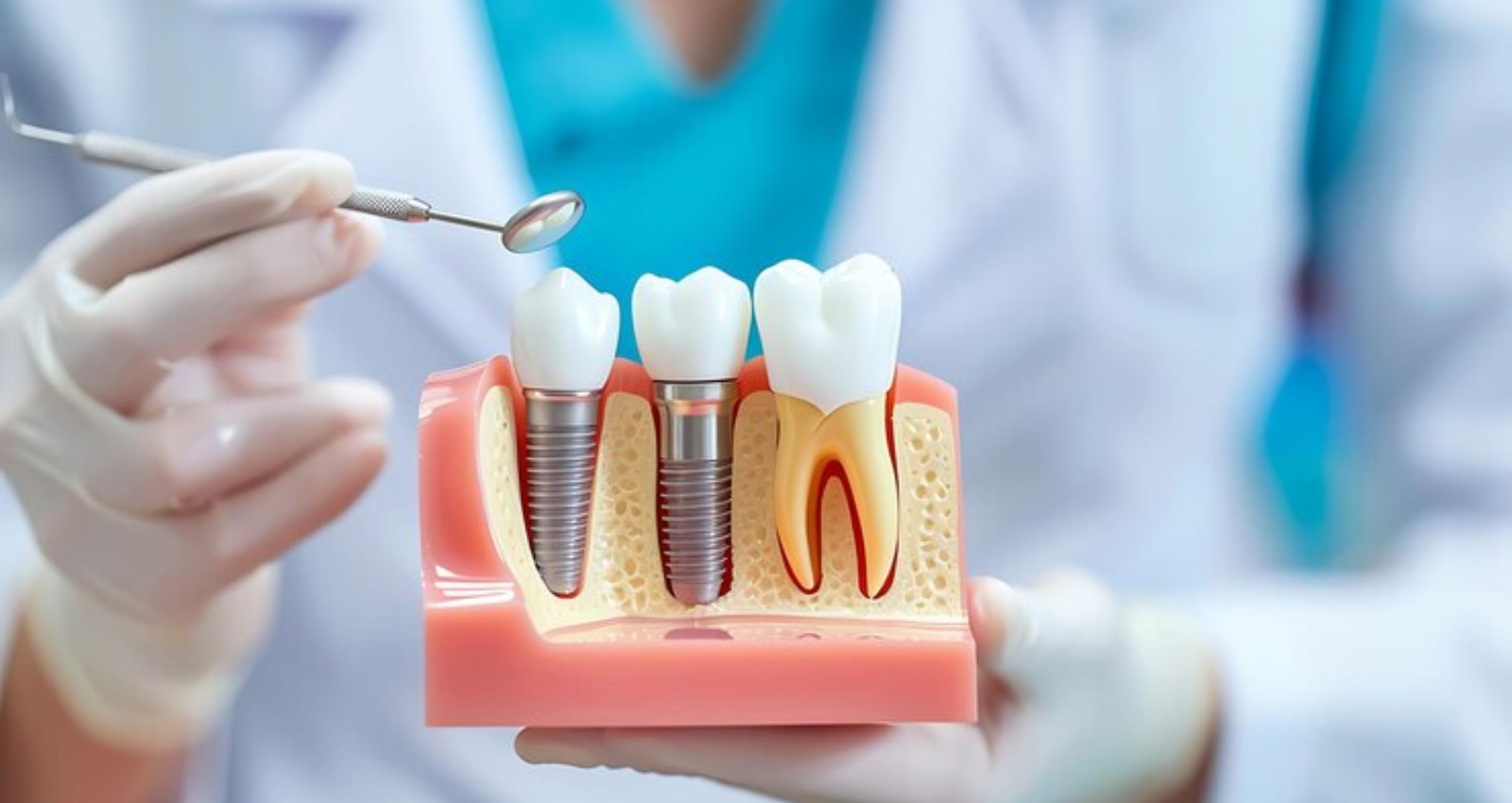
Missing teeth can be a source of self-consciousness and discomfort. They can affect your ability to eat and speak clearly and even impact your self-esteem. Fortunately, dental implants offer a revolutionary solution for replacing missing teeth and restoring a natural, healthy smile. Unlike dentures or bridges, which come with their own set of drawbacks, implants provide a long-term option with a multitude of benefits that go far beyond aesthetics. This blog delves into the many advantages of dental implants, focusing on their lasting impact on your oral health and overall well-being.
Understanding Dental Implants
A dental implant is a small, screw-like post made of titanium, a biocompatible material that fuses with the jawbone over time. This creates a strong foundation for a replacement tooth, typically a crown made of porcelain or zirconia that closely resembles a natural tooth. The implant procedure usually involves two stages:
Surgical placement: The implant is surgically inserted into the jawbone at the site of the missing tooth.
Abutment and crown placement: After a healing period, a small connector piece called an abutment is attached to the implant. Finally, a custom-made crown is secured on the abutment, creating the visible replacement tooth.
The Long-Term Advantages Of Getting Dental Implants
Dental implants are a remarkable innovation in dentistry, offering a permanent and natural-looking solution for missing teeth. But their benefits go far beyond simply replacing a tooth. Let’s delve deeper and explore the key long-term advantages of dental implants:
Enhanced Durability and Longevity
Unlike dentures or bridges, which may need to be replaced every few years due to wear and tear, dental implants are built to last. Crafted from biocompatible titanium, they fuse with the jawbone through a process called osseointegration. With proper care, including regular brushing, flossing, and professional dental cleanings, dental implants can function for decades or even a lifetime. As a result, it eliminates the need for costly and inconvenient replacements.
Improved Oral Health and Reduced Risk of Future Problems
Traditional bridges often require grinding down healthy teeth to support the replacement tooth. Dental implants, however, stand alone. This not only preserves the health of your surrounding teeth but also eliminates the potential for future decay or gum disease that can occur around bridgework. Additionally, dental implants allow for easier and more thorough cleaning, further promoting good oral health.
Natural Function and Appearance
Dental implants are uniquely designed to mimic the natural structure of a tooth root. This provides two significant benefits:
Stimulates Jawbone Health: The implant post acts like a natural tooth root, stimulating the jawbone during chewing. This prevents bone loss, a common issue with missing teeth that can lead to a sunken facial appearance. By maintaining jawbone health, dental implants help preserve your natural facial structure and youthful contours.
Enhanced Biting and Chewing: The secure anchoring of the implant allows for natural biting and chewing force, similar to your original teeth. This improved function translates to a more enjoyable eating experience. You can confidently savor a wider variety of foods without worrying about limitations or discomfort.
Exceptional Stability and Unmatched Comfort
Dentures are notorious for slipping and causing discomfort, especially when eating or speaking. Dental implants, on the other hand, are firmly anchored in the jawbone, providing exceptional stability. This eliminates the constant worry of your teeth shifting or moving. You can enjoy your favorite foods with confidence and speak freely without the fear of embarrassment.
Boosted Self-Esteem and Confidence
Missing teeth can significantly impact your self-confidence, affecting your willingness to smile, laugh, and engage in social interactions. Dental implants restore a natural-looking smile, allowing you to express yourself freely without self-consciousness. This newfound confidence can positively impact your social and personal life, allowing you to smile brighter and connect with others more openly.
Improved Speech and Clear Communication
Ill-fitting dentures can significantly hinder your speech, causing slurring or mumbling. Because dental implants function just like natural teeth, they eliminate these speech impediments. You can communicate clearly and confidently, ensuring your words are understood with ease.
Reduced Bone Loss and Maintained Facial Structure
As mentioned earlier, when a tooth is lost, the jawbone beneath it begins to deteriorate due to lack of stimulation. Dental implants prevent this bone loss by mimicking the tooth root and stimulating the jawbone during chewing. This maintains a healthy jawbone structure, which is essential for supporting facial features and preventing the sunken appearance that can occur with missing teeth.
Convenience and Freedom
Dentures require daily removal for cleaning and soaking in solutions. This can be a messy and inconvenient process. Dental implants, on the other hand, are permanent fixtures that function just like natural teeth. They require no special cleaning solutions or adhesives, offering unmatched convenience and freedom in your daily routine.
Are Dental Implants Right for You?
Overall Health
Underlying medical conditions: Certain conditions, like uncontrolled diabetes or a weakened immune system, can affect healing and increase the risk of infection after surgery. Discuss any pre-existing health conditions with your dentist to determine if implants are suitable.
Medications: Some medications, such as blood thinners, may need to be adjusted before and after surgery.
Jawbone Health
Bone density: Dental implants rely on sufficient bone in your jaw for secure placement and long-term stability. Your dentist will assess your jawbone health with X-rays or CT scans.
Bone loss: If you’ve experienced significant bone loss due to missing teeth or gum disease, bone grafting procedures might be needed to build up the jawbone before implant placement.
Lifestyle Habits
Smoking: Smoking significantly hinders healing and increases the risk of implant failure due to reduced blood flow and impaired immune response. Quitting smoking well in advance of surgery, and ideally altogether, is highly recommended for successful implant treatment.
Oral hygiene: Maintaining excellent oral hygiene is crucial for the long-term success of dental implants. Regular brushing, flossing, and professional dental cleanings are essential to prevent gum disease, which can damage the implant and surrounding bone.
Additional Considerations
Cost: Dental implants are typically a more expensive option compared to dentures or bridges. However, their durability and long-term benefits can make them a cost-effective investment in the long run.
Alternatives: Depending on your specific situation, other tooth replacement options like bridges or dentures might be suitable alternatives. Discuss all possibilities with your dentist to find the best solution for your needs and budget.
Dental implants offer a myriad of long-term benefits, making them a premier choice for tooth replacement. Beyond restoring a natural appearance and function, implants promote oral health by preventing bone loss and maintaining facial structure. Their durability and stability ensure a long-lasting solution that often outlives other alternatives. With proper care, implants can last a lifetime, making them a cost-effective choice in the long run. Ultimately, dental implants not only enhance your smile but also contribute to your overall health and well-being for years to come.


